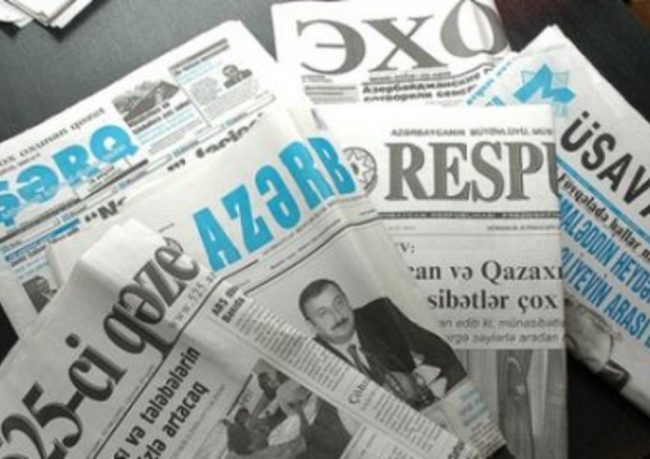

 Despite official censorship in the early days of Azerbaijan’s independence, journalists enjoyed more freedom then than they do now. Oligarchic control over the country’s media and fear of prosecution, or even death, mean many journalists now resort to self-censorship.
Despite official censorship in the early days of Azerbaijan’s independence, journalists enjoyed more freedom then than they do now. Oligarchic control over the country’s media and fear of prosecution, or even death, mean many journalists now resort to self-censorship.
Freelance journalist Aynur Elgunesh remembers the early years, after the country gained its freedom from the Soviet Union in 1991. She says that back then, despite the media having practically no financial resources, there were a lot of independent outlets.
‘As a result of our persistent activities, the rights of journalists and the media were protected’, she says, noting the abolition of censorship in 1998 as an example of this struggle.
Many mass media organisations that were free 25–30 years ago have now either disappeared or lost their independence. The Turan Information Agency has been labelled by Reporters Without Borders as ‘Azerbaijan’s last independent media outlet’.
Mehman Aliyev, director of the agency, describes the financial pressure they have faced. ‘Firstly, the media was destroyed economically, by cutting away its support’, he says.
Aliyev stresses that the advertising market has now been monopolised, and that gradually these changes have been followed by amendments to the law to allow the government to penalise media outlets and arrest journalists.
‘If you’re not economically independent, you cannot be truly independent. They control you with money, commanding what and how you write. This is financial censorship’, Aliyev says.
A broken bridge
‘Today, on the contrary [to in the 1990s], media agencies have sources of funding. There is money, there are media magnates, there are large media holdings. But most of them are funded from dirty money. The vast majority of journalists who once fought for freedom of speech have become slaves of the authorities’ dirty money. As a result, free media has almost disappeared’, Elgunesh tells OC Media.
‘The media is concentrated in the hands of a few officials, known as oligarchs. The main task of these media outlets is not only to support the government’s policy, but also to protect the state figure who gives the money’, she says.
According to her, the media cannot criticise any civil servant, even a minor one, because they are all backed by high-ranking officials who can attack the outlet and the journalists immediately.
‘We only see a critical article about an official when it’s ordered from another state figure. Today, the media is no longer a bridge between citizens and the government. It’s much more like a battlefield that demonstrates the power of the government and the oligarchs’, Elgunesh says.
At present, the country’s media policy is determined by the government, according to Alasgar Mammadli, an expert on media law formerly with USAID in Azerbaijan. He says the government officially spends around ₼80 million ($47 million) a year to keep local media outlets running.
‘There are also unofficial sources [of funding], some of which we are aware of and some which are still unknown. In order to make journalists serve the interests of the government, money is siphoned directly to the media. In other words, the media leads the government’s propaganda, no matter if it’s right or wrong’, Mammadli tells OC Media.
Soviet traditions
The journalists and media experts OC Media spoke with said that reporters who investigate the business interests of the ruling family, and their money hidden in offshores, are most at risk. Soon the voices of those journalists are heard from prison, as the cases of investigative journalists Khadija Ismayil and Afghan Mukhtarli prove.
Mammadli says media outlets find it difficult to function if they are not under the government’s control. ‘In order to survive, an outlet should serve their interests.’
‘Such regimes have their own truth. Any alternative to this [truth] is a danger to authoritarian and totalitarian regimes, and the more widespread it is the more dangerous. Today, just being able to tell the truth is one of the most serious problems facing the media in Azerbaijan. Because if society knows truths, they will think about the right choices. If society wants to make the right choice, the current structure may change’, Mammadli says.
Elgunesh says media outlets cannot even cover the problems of ordinary people. According to her, the media are instructed to write articles about the country’s development, as in Soviet times, and writing about negative things is forbidden.
‘They’re trying to keep the tradition of the Soviet times. TV stations especially are implementing this policy’, the journalist says.
Structural censorship
‘The nightmare of the media’; this is how Mehman Aliyev calls the police, state agencies, and the judiciary, who he says are all in the hands of the government, he labels this informal censorship.
‘Every year, 10–15 journalists are arrested. Some of them are released, and at the same time, others are arrested again. There is also pressure from other official bodies, and Journalists are summoned to the Prosecutor’s Office. They warn them; they threaten them. These are all signs of censorship. Therefore, self-censorship in the Azerbaijani media is quite high. It comes from the fear.’
Journalists say the warnings are more like threats. Alasgar Mammadli stresses that the arrest and murder of journalists in Azerbaijan is the basis of informal and self-censorship.
‘After the murder of journalist Elmar Huseynov in Azerbaijan in 2005, all media became self-censored. This prevents journalists from expressing their opinions and telling the truth. Self-censorship has been transformed into structural censorship. Today, some people think social media is partly free, and anyone can write anything. In fact, this is not true.’
Mammadli says censorship is gradually being given a legal basis. He shows some of the latest legal changes as an example.
‘In recent changes to the law on military status in 2017, censorship was officially introduced into the legislation. It means during wartime, the government will be able to apply censorship officially. This despite the Constitution’s 50th article prohibiting censorship of the media’, he says.
Elgunesh notes the ban on foreign media that is already in place in the country.
‘For instance, Meydan TV is based in Germany, RFE/RL’s Baku bureau has been operating from Prague since the Baku office shut down [in 2015]. However, these are not the only obstacles, broadcasting of foreign media outlets is also being restricted, their websites have been blocked by court orders’, he says.
‘Lack of professionalism’
Mushfig Alasgarli, Deputy Chairman of the Press Council, a self-regulatory media authority, tells OC Media that ‘a free environment has been created for the media in Azerbaijan’.
He insists there is no official or unofficial censorship in the country. ‘The professionalism of the media can be an issue’, he adds. ‘Everyone is commenting on this their own way.’
Alasgarli says the main problem occurs with online media. According to official figures, around 80% of the population uses the internet, and ‘not all of them can be professional as media workers. Fighting against these situations is normal’, he says.
‘In Azerbaijan, both the Press Council and the authorities are struggling with negative journalism, which operates in an unprofessional manner. They leave behind traditional media and register a domain by paying a symbolic figure, create a website, and declare themselves media outlets. They do not follow any professional codex. The fight is carried out and must be carried out against them. They make serious mistakes. Both the legislation of the country and the European Convention on Human Rights do not acknowledge such activities. Unfortunately, the struggle against these negative phenomena is called a censorship by some people’, Alasgarli says.
[Read OC Media’s story on structural censorship in Kabardino-Balkaria: Kabardino-Balkaria’s code of silence]









